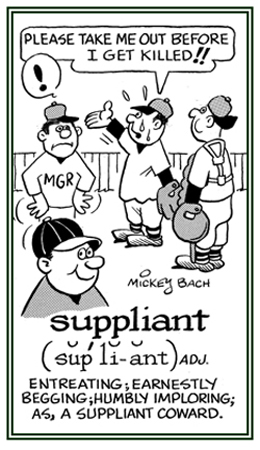sub-, suc-, suf-, sug-, sum-, sup-, sur-, sus-, su-
(Latin: under, below, beneath; used as a prefix as shown in various formats below)
Don't confuse the sur- in this element with the sur- in super-. Note: sub- regularly means "under", but it often changes its form as it retains or keeps its meaning:
The prefix sub- often becomes suc- before c: succumb.
The prefix sub- often becomes suf- before f: suffuse.
The prefix sub- often becomes sug- before g: suggest.
The prefix sub- often becomes sum- before m: sumptuous.
The prefix sub- often becomes sup- before p: suppression.
The prefix sub- often becomes sur- before r: surrogate.
The prefix, sub- is often simplified to su- before sp; as seen in suspect, suspend, suspicion, suspension, et al. Before c, p, and t; it is sometimes formed into sus-.
suffocate (SUHF uh kayt") (verb), suffocates; suffocated; suffocating
1. To deprive someone of air or to prevent from breathing, to be unable to breathe: In the newspaper Linda read about two young boys who were suffocated because of fumes from the fire in the apartment where they lived with their parents.
2. To impair respiration; to smother, to asphyxiate: Lynn fell down so badly from the table that the impact on the floor suffocated her for a few minutes before she could breathe normally again.
3. To die from a lack of air when something prevents him or her from breathing: A terrible accident occurred when the little girl suffocated herself by putting a plastic bag over her head.
4. To feel or to make someone uncomfortable as a result of excessive heat and/or a lack of fresh air: The German tourists were not used to such heat in the Mojave Desert while they were on their trip and they thought they would suffocate if they didn’t find a cooler spot to rest and drink water.
5. To be or to feel confined and restricted when trying to express oneself: While Mary was growing up, her parents suffocated her so much with rules and strict regulations that she could hardly wait until she was 18 so she would be able to move away from them.
6. Etymology: from Latin suffocare, "to choke"; from sub-, "under, down" and fauces, "throat, narrow entrance".
2. To impair respiration; to smother, to asphyxiate: Lynn fell down so badly from the table that the impact on the floor suffocated her for a few minutes before she could breathe normally again.
3. To die from a lack of air when something prevents him or her from breathing: A terrible accident occurred when the little girl suffocated herself by putting a plastic bag over her head.
4. To feel or to make someone uncomfortable as a result of excessive heat and/or a lack of fresh air: The German tourists were not used to such heat in the Mojave Desert while they were on their trip and they thought they would suffocate if they didn’t find a cooler spot to rest and drink water.
5. To be or to feel confined and restricted when trying to express oneself: While Mary was growing up, her parents suffocated her so much with rules and strict regulations that she could hardly wait until she was 18 so she would be able to move away from them.
6. Etymology: from Latin suffocare, "to choke"; from sub-, "under, down" and fauces, "throat, narrow entrance".
suffocating
1. To kill or destroy by preventing access to air or oxygen.
2. To impair the respiration of; asphyxiate.
3. To cause discomfort to by or as if by cutting off the supply of fresh air.
4. To suppress the development, imagination, or creativity of; to stifle; such as, “The rigid formality of the place suffocated her.”
5. To die from lack of air or oxygen; to be asphyxiated.
6. To feel discomfort from lack of fresh air.
7. To become or feel suppressed; to be stifled.
2. To impair the respiration of; asphyxiate.
3. To cause discomfort to by or as if by cutting off the supply of fresh air.
4. To suppress the development, imagination, or creativity of; to stifle; such as, “The rigid formality of the place suffocated her.”
5. To die from lack of air or oxygen; to be asphyxiated.
6. To feel discomfort from lack of fresh air.
7. To become or feel suppressed; to be stifled.
suffocation
1. The state of being choked by obstruction of air passages by drowning, smothering, throttling, or inhalation of noxious gases.
2. The prevention of breathing, usually by the obstruction of the nose, mouth, or trachaea.
2. The prevention of breathing, usually by the obstruction of the nose, mouth, or trachaea.
Synonyms include:
- Asphyxiation, smothering, stifling; choking, strangulation, garroting.
- To suppress, to quell, to put down, to subdue, to overcome, to extinguish, to dampen, to snuff out.
1. The right to vote in public elections: Suffrage most often takes place in democratic elections.
2. A vote given in favor of a proposed measure, candidate, etc.: A vote, or suffrage, is needed in order to elect an individual for a specific office or trust.
3. Etymology: "prayers or pleas on behalf of another", from Old French suffrage, from Medieval Latin suffragium, from Latin suffragium, "support, vote, right of voting", from suffragari, "to lend support, to vote for someone"; from sub-, "under" + fragor, "crash, din, shouts (as of approval)"; related to frangere, "to break".
2. A vote given in favor of a proposed measure, candidate, etc.: A vote, or suffrage, is needed in order to elect an individual for a specific office or trust.
3. Etymology: "prayers or pleas on behalf of another", from Old French suffrage, from Medieval Latin suffragium, from Latin suffragium, "support, vote, right of voting", from suffragari, "to lend support, to vote for someone"; from sub-, "under" + fragor, "crash, din, shouts (as of approval)"; related to frangere, "to break".
summon (verb), summons; summoned; summoning
To send for, to call for, to request the presence of, to invite: Mike was told to summon the police to come as soon as possible to stop the burglars from going into the neighbor's house.
The judge summoned three witnesses to testify about the robbery they saw at the bank.
supplement
supplemental (adjective), more supplemental, most supplemental
1. Pertaining to something which is in addition to what is already currently present, or to add to when there is a lack or deficiency: Mrs. Johnson gave her students supplemental reading material to take home for further information about their topics that they were to prepare for the next day.
2. Etymology: from Latin supplementum, "that which is added to supply a shortage"; from supplere, "to provide something" from sub, "under" + placare "to calm, to appease, to quiet, to soothe".

© ALL rights are reserved.
Go to this Word A Day Revisited Index
2. Etymology: from Latin supplementum, "that which is added to supply a shortage"; from supplere, "to provide something" from sub, "under" + placare "to calm, to appease, to quiet, to soothe".

Go to this Word A Day Revisited Index
so you can see more of Mickey Bach's cartoons.
supplementally
supplementary
supplementation
suppliant (adjective), more suppliant, most suppliant
1. Concerning an entreaty or plea, particularly to someone who is in authority or in power: Judy went to church on Sunday and was very suppliant when she appealed to God in a humble way to save her sister from dying of cancer.
2. Etymology: from Latin supplicare; "to beg, to beseech, to entreat."

© ALL rights are reserved.
Go to this Word A Day Revisited Index
2. Etymology: from Latin supplicare; "to beg, to beseech, to entreat."

Go to this Word A Day Revisited Index
so you can see more of Mickey Bach's cartoons.
supplicate (SUHP li kayt") (verb), supplicates; supplicated; supplicating
To plead or to beseech for something earnestly and humbly: Sometimes, when a student hasn't been able to complete a homework assignment on time, he or she might supplicate the teacher for an extension of the deadline.

© ALL rights are reserved.
Go to this Word A Day Revisited Index
There are many who supplicate God for His guidance and strength so they can live an honest and righteous life.

Go to this Word A Day Revisited Index
so you can see more of Mickey Bach's cartoons.
The act of begging or earnestly asking for something.
supply
support (verb), supports; supported; supporting
1. To carry the weight of, especially from below: The heavy steel beams were supporting the weight of the bridge.
2. To maintain in position so as to keep from falling, sinking, or slipping: As the life guard was saving the woman, he told her that he would support her in the water until she was safe on the beach again.
3. To be able to bear or to withstand: Hanna was emotionally supporting her mother during the crisis after the fire destroyed her house.
4. To provide for, by supplying with money or necessities: When prices increased, Sam found it hard to support his wife and children with his small salary.
5. Etymology: from Latin supportare, "to convey, to carry, to bring up"; from sub, "under" + portare, "to carry".
2. To maintain in position so as to keep from falling, sinking, or slipping: As the life guard was saving the woman, he told her that he would support her in the water until she was safe on the beach again.
3. To be able to bear or to withstand: Hanna was emotionally supporting her mother during the crisis after the fire destroyed her house.
4. To provide for, by supplying with money or necessities: When prices increased, Sam found it hard to support his wife and children with his small salary.
5. Etymology: from Latin supportare, "to convey, to carry, to bring up"; from sub, "under" + portare, "to carry".


